Location
Nilai, Malaysia
Partners (University/Community Partner Organisation)
Malay Agricultural Settlement (MAS) of Kampong Bharu, Kuala Lumpur, Malaysia
Description
Mizan Knowledge for Change (K4C0 Hub was officially established in 2019 when two academics of Mizan Research Centre (MRC), Universiti Sains Islam Malaysia (USIM) along with a representative of Malay Agricultural Settlement (MAS) of Kampong Bharu, Kuala Lumpur, Malaysia completed the Mentor Training Program (MTP), organized by the UNESCO Chair. In 2021, two more academics of USIM and the President of Malaysia Youth Council joined the MTP representing Mizan K4C Hub. The Mizan K4C hub is expecting to have more academics to join the Mentor Training Program (MTP) to ensure the hub is supported by academics and civil society partners with clear understanding of community engagement methodology.
The Mizan K4C Hub has incorporated the methodology of community engagement especially Comomunity-Based Participatory Research (CBPR) mainly in research and academics. Nonethelss, due to the widespread of Covid 19 Pandemic since March 2020, The Mentors are mostly conducting its activities online without physical interaction with the community with exception on projects related to health education by Assoc. Prof. Dr. Mohd. Dzulkhairi Mohd. Rani, from the Faculty of Medical and Health Sciences, USIM. Below are some of the activities that have been recorded by Mizan K4C Hub in 2021 :
Mentors
Assoc. Prof. Dr. Mahazan Abdul Mutalib
Dr. Izawati Wook
Assoc. Prof. Dr. Mohd. Dzulkhairi Mohd. Rani
Dr. Khairunneezam Mohd. Noor
Mr. Jufitri Joha – Civil Society
Miss Khairiyah Lani – Public
Projects
Engagement with Malaysian Human Rights Commission (Suhakam), Malaysia
Project Initiator : Dr. Izawati Wook, Faculty of Syariah and Law USIM & Mentor, Mizan K4C Hub, USIM
Date: 21 May 2021
- Research activity: Presenting research finding to Suhakam commissioners and officers on indigenous peoples’ position in Malaysia. Suhakam is a Malaysian Human Rights Commission
- The research was commissioned by Suhakam to investigate the possibility of internalisation of United Nation Declaration on the Rights of Indigenous Peoples in Malaysian law and policy. The research partly presented the views of communities’ representatives gathered through focus group discussions and interviews.
- Venue: online
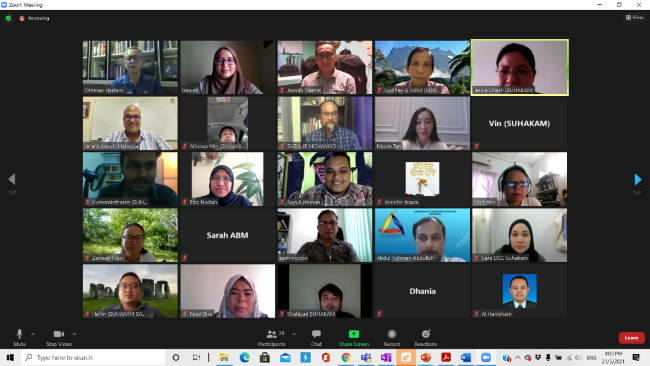
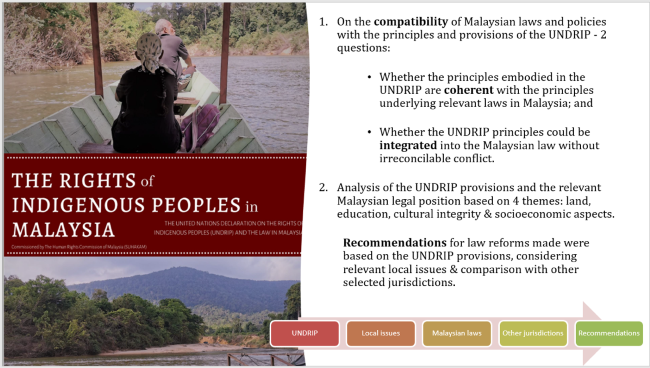
Tracking with Orang Asli guides – researching Orang Asli perspectives on customary land and law
Project Initiator : Dr. Izawati Wook, Faculty of Syariah and Law USIM & Mentor, Mizan K4C Hub, USIM
Date: March 2020
- Venue: Kampung Peta, Endau Rompin National Park, Johor, Malaysia
- Participants: 2 researchers and family members and 2 Orang Huluk tourist guides (indigenous peoples)
- Outcome: The Orang Huluk, who are tourist guides, in a casual conversation shared their experience and views on their life and livelihood living within National Park. From our observation and conversation, we presented our finding in a paper, which the abstract is attached below.
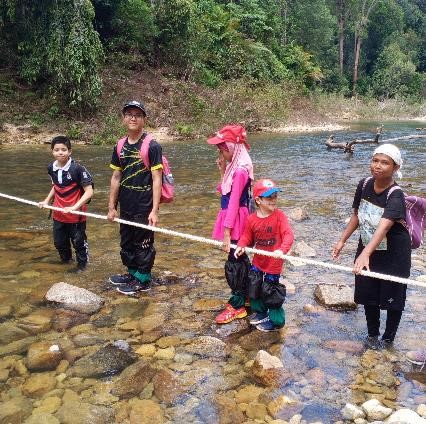
Focus group discussion – researching Orang Asli perspectives on customary land and the law
Project Initiator : Dr. Izawati Wook, Faculty of Syariah and Law USIM & Mentor, Mizan K4C Hub, USIM
Date: December 2020
- Venue: Kampung Peta, Endau Rompin National Park, Johor, Malaysia
- Participants: 2 researchers and 7 Orang Huluk (indigenous peoples)
- Outcome:
The community members shared their experience and views on their life and livelihood living within National Park.
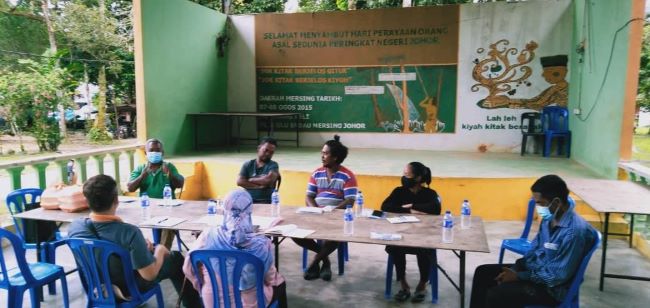
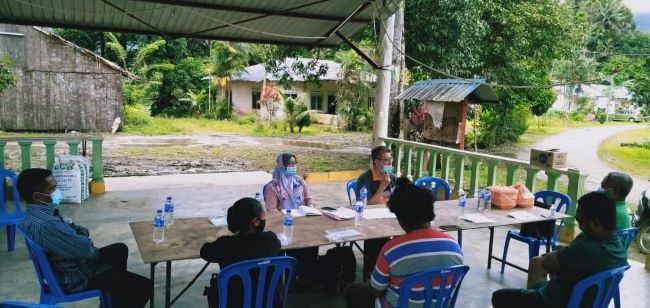
Focus Group Discussion and Sharing session with CBPR approach
Project Initiator : Assoc. Prof. Dr. Mohd. Dzulkhairi Mohd. Rani, Faculty of Medical and Health Sciences, & Mentor, Mizan K4C Hub, USIM
Date: 14 March 2021
- Venue: Kampung Orang Asli Ulu Kelaka (Indigenous Community)
- Participation: 6 Academician, 10 adult and 25 children of Orang Asli; 10 students from the medical faculty were exposed and trained in using CBPR during this session
- Outcome of the activity: The community members shared their experience and knowledge on traditional remedies to treat common cold and fever. The shared their views on the current pandemic situation and how they prevent COVID-19 from spreading within their community. Most of them have positive perception on the vaccine programme and all of them hope that the pandemic will end soon. The children were excited to show us steps in using alcohol hand sanitizer to clean their hands.
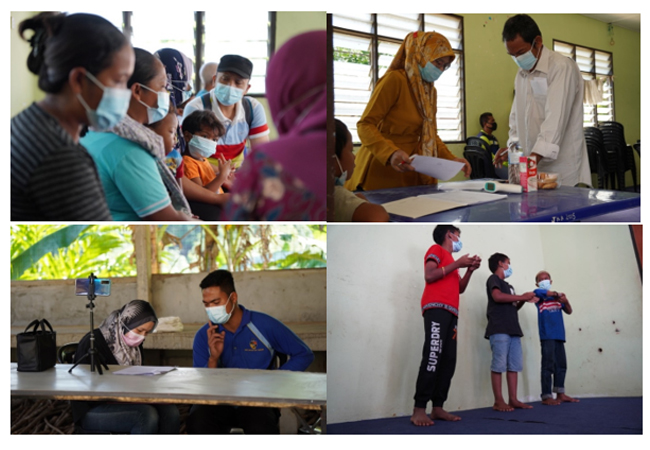
Drawing and art session using CBPR approach
Project Initiator : Assoc. Prof. Dr. Mohd. Dzulkhairi Mohd. Rani, Faculty of Medical and Health Sciences, & Mentor, Mizan K4C Hub, USIM
Date: 28 March 2021
- Venue: Kampung Orang Asli Ulu Kelaka (Indigenous Community)
- Participation: 6 Academician, 30 children of Orang Asli; 8 students from the medical faculty were exposed and trained in using CBPR during this session
- Outcome of the activity: The children were excited to express their feelings and view on COVID-19. They illustrated that they need to fight COVID-19 (using fire-arms), ran away from COVID-19 (using motorbike) and most importantly they need to stay at home as an effective method of disease prevention.
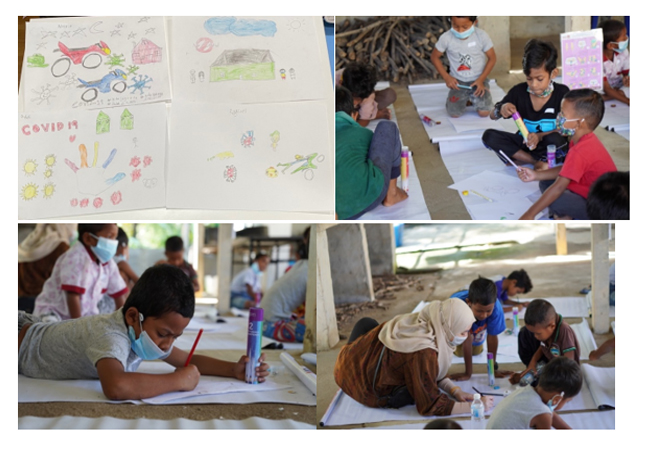
Book Publication “The Future of Leadership in Higher Education Leadership”
Project Initiator : Assoc. Prof. Dr. Mahazan Abdul Mutalib, Faculty of Leadership and Management, USIM
Date: In Progress
- Publisher : USIM PRESS, Nilai, Negeri Sembilan Malaysia
- The book discusses the nature of higher education leadership from the perspectives of education as well as community engagement. The book argues that the world is now facing a new era of higher education colonialism and imperialism that mostly consider the publics and societies as customers or stakeholders of universities. The Global ranking methodology of higher education was also analyzed in this book. The book argues higher education needs to revisit its approach in working with community in order to be impactful. Some of the alternatives discuss in the book are diverting leadership attention from ranking based methodology to community oriented methodology, open access initiative, and the adoption of community-based participatory methodology (CBPR) in knowledge creation process. The book is written in Malaysian (Malay) language. A special section on Mizan K4C Hub is also discussed in the book.
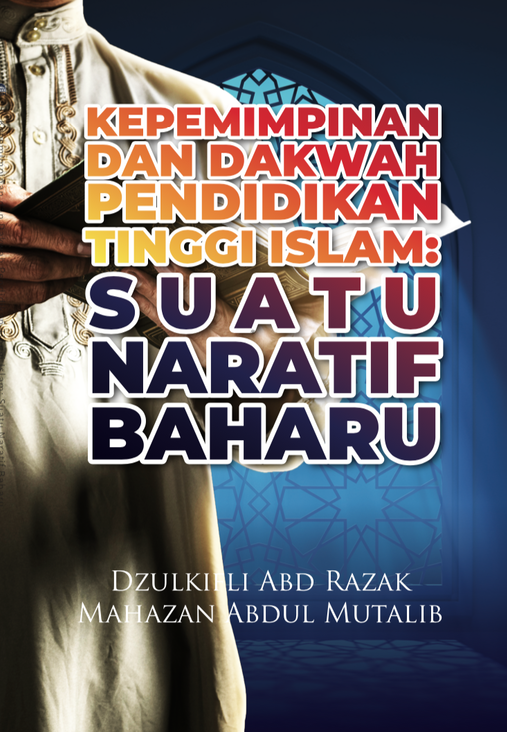
Roundtable Discussion with Community leaders (mosque leaders), academics, and religious officers – Roles of community leaders to combat corruption in society
Project Initiator : Assoc. Prof. Dr. Mahazan Abdul Mutalib, Faculty of Leadership and Management, USIM
Date: 15 May 2021
- Venue: Online Platform
- Research Focus : Researching the perspectives of community leaders and religious officers on the issue of corruption in Malaysia particuparly in the context of public organizations
- Participants: 5 community leaders, 10 religious officers, and 1 mosque leadership observer /
- Outcomes: The workshop has concluded that government religious officers should engage community leaders when developing policies and guidelines in managing community and religious affairs of the country. Mosque leaders, especially in the context of South East Asia, have been traditionally regarded as community leaders in Muslims’ society and they serve the community in both daily and religious matters. Nonetheless, the integrity and professionalism of mosque leaders must always be preserved. This includes transparency of mosque financial management and mosque leaders leadership quality. It is expected that serious of workshops conducted by the researchers with mosque leaders and government officials can somehow help the government to produce policies and guidelines of mosque management and leadership that is more community – oriented and not consider mosque leaders as agents of religious authority.
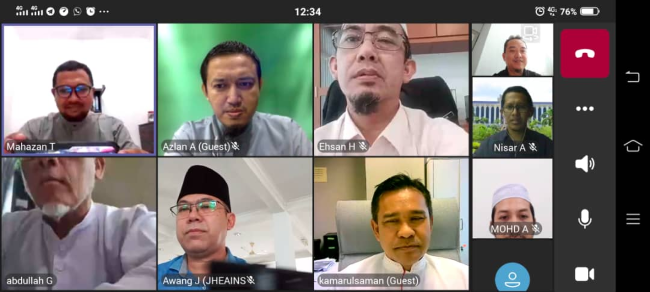
Contact Details of the Hub Coordinator
Assoc. Prof. Dr. Mahazan Abdul Mutalib – mahazanusim@gmail.com

